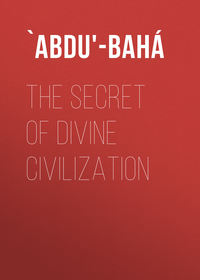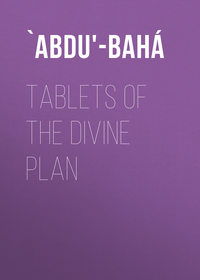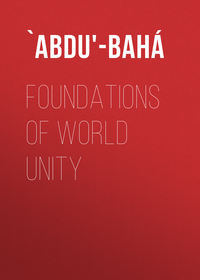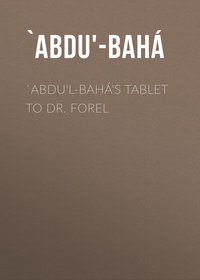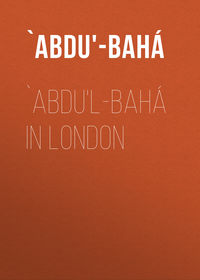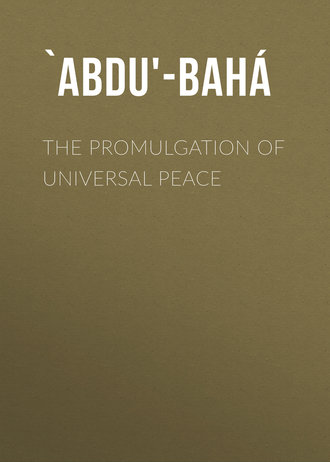 полная версия
полная версияThe Promulgation of Universal Peace
TALK ‘ABDU’L-BAHÁ DELIVERED IN PITTSBURGH
7 May 1912
Talk at Hotel Schenley
Pittsburgh, Pennsylvania
Notes by Suzanne BeattyI have come from the Orient to visit your country. Surely this continent is praiseworthy from all points of view, and there are signs of prosperity everywhere. The people show refinement, and evidences of progressive civilization abound. I will give you a brief exposition of the fundamental principles of Bahá’u’lláh’s teachings in order that you may be informed of the nature and significance of the Bahá’í movement.
About sixty years ago the greatest enmity and strife existed among the various peoples and religious denominations of Persia. Throughout the world generally war and dissension prevailed. At this time Bahá’u’lláh appeared in Persia and began devoting Himself to the uplift and education of the people. He united divergent sects and creeds, removed religious, racial, patriotic and political prejudices and established a strong bond of unity and reconciliation among varying degrees and classes of mankind. The enmity then existing among the people was so bitter and intense that even ordinary association was out of the question. They would not meet and consult with each other at all. Through the power of the teachings of Bahá’u’lláh the most wonderful results were witnessed. He removed the prejudices and hatred from human hearts and wrought such transformation in their attitudes toward each other that today in Persia there is perfect accord among hitherto bigoted religionists, varying sects and divergent classes. This was not an easy accomplishment, for Bahá’u’lláh underwent severe trials, great difficulties and violent persecution. He was imprisoned, tortures were inflicted upon Him, and finally He was banished from His native land. He bore every ordeal and infliction cheerfully. In His successive exiles from country to country up to the time of His ascension from this world, He was enabled to promulgate His teachings, even from prison. Wherever His oppressors sent Him, He hoisted the standard of the oneness of the world of humanity and promulgated the principles of the unity of mankind. Some of these principles are as follows. First, it is incumbent upon all mankind to investigate truth. If such investigation be made, all should agree and be united, for truth or reality is not multiple; it is not divisible. The different religions have one truth underlying them; therefore, their reality is one.
Each of the divine religions embodies two kinds of ordinances. The first is those which concern spiritual susceptibilities, the development of moral principles and the quickening of the conscience of man. These are essential or fundamental, one and the same in all religions, changeless and eternal—reality not subject to transformation. Abraham heralded this reality, Moses promulgated it, and Jesus Christ established it in the world of mankind. All the divine Prophets and Messengers were the instruments and channels of this same eternal, essential truth.
The second kind of ordinances in the divine religions is those which relate to the material affairs of humankind. These are the material or accidental laws which are subject to change in each day of manifestation, according to exigencies of the time, conditions and differing capacities of humanity. For instance, in the day of Moses ten commandments in regard to murder were revealed by Him. These commandments were in accordance with the requirements of that day and time. Other laws embodying drastic punishments were enacted by Moses—an eye for an eye, a tooth for a tooth. The penalty for theft was amputation of the hand. These laws and penalties were applicable to the degree of the Israelitish people of that period, who dwelt in the wilderness and desert under conditions where severity was necessary and justifiable. But in the time of Jesus Christ this kind of law was not expedient; therefore, Christ abrogated and superseded the commands of Moses.
In brief, every one of the divine religions contains essential ordinances, which are not subject to change, and material ordinances, which are abrogated according to the exigencies of time. But the people of the world have forsaken the divine teachings and followed forms and imitations of the truth. Inasmuch as these human interpretations and superstitions differ, dissensions and bigotry have arisen, and strife and warfare have prevailed. By investigating the truth or foundation of reality underlying their own and other beliefs, all would be united and agreed, for this reality is one; it is not multiple and not divisible.
The second principle or teaching of Bahá’u’lláh is the proclamation of the oneness of the world of humanity—that all are servants of God and belong to one family; that God has created all and, therefore, His bestowals are universal; and that His providence, training, sustenance and loving-kindness surround all mankind.
This is the divine policy, and it is impossible for man to lay the foundation of a better plan and policy than that which God has instituted. Therefore, we must recognize and assist the purpose of the glorious Lord. Inasmuch as God is kind and loving to all, why should we be unkind? As this human world is one household, why should its members be occupied with animosity and contention? Therefore, humanity must be looked upon with the eye of equal estimate and in the same attitude of love. The noblest of men is he who serves humankind, and he is nearest the threshold of God who is the least of His servants. The glory and majesty of man are dependent upon his servitude to his fellow creatures and not upon the exercise of hostility and hatred.
The third principle or teaching of Bahá’u’lláh is the oneness of religion and science. Any religious belief which is not conformable with scientific proof and investigation is superstition, for true science is reason and reality, and religion is essentially reality and pure reason; therefore, the two must correspond. Religious teaching which is at variance with science and reason is human invention and imagination unworthy of acceptance, for the antithesis and opposite of knowledge is superstition born of the ignorance of man. If we say religion is opposed to science, we lack knowledge of either true science or true religion, for both are founded upon the premises and conclusions of reason, and both must bear its test.
The fourth principle or teaching of Bahá’u’lláh is the readjustment and equalization of the economic standards of mankind. This deals with the question of human livelihood. It is evident that under present systems and conditions of government the poor are subject to the greatest need and distress while others more fortunate live in luxury and plenty far beyond their actual necessities. This inequality of portion and privilege is one of the deep and vital problems of human society. That there is need of an equalization and apportionment by which all may possess the comforts and privileges of life is evident. The remedy must be legislative readjustment of conditions. The rich too must be merciful to the poor, contributing from willing hearts to their needs without being forced or compelled to do so. The composure of the world will be assured by the establishment of this principle in the religious life of mankind.
The fifth principle or teaching of Bahá’u’lláh is the abandoning of religious, racial, patriotic and political prejudices, which destroy the foundations of human society. All mankind are creatures and servants of the one God. The surface of the earth is one home; humanity is one family and household. Distinctions and boundaries are artificial, human. Why should there be discord and strife among men? All must become united and coordinated in service to the world of humanity.
The sixth principle or teaching of Bahá’u’lláh concerns the equality of man and woman. He has declared that in the estimation of God there is no distinction of sex. The one whose heart is most pure, whose deeds and service in the Cause of God are greater and nobler, is most acceptable before the divine threshold—whether male or female. In the vegetable and animal kingdoms sex exists in perfect equality and without distinction or invidious estimate. The animal, although inferior to man in intelligence and reason, recognizes sex equality. Why should man, who is endowed with the sense of justice and sensibilities of conscience, be willing that one of the members of the human family should be rated and considered as subordinate? Such differentiation is neither intelligent nor conscientious; therefore, the principle of religion has been revealed by Bahá’u’lláh that woman must be given the privilege of equal education with man and full right to his prerogatives. That is to say, there must be no difference in the education of male and female in order that womankind may develop equal capacity and importance with man in the social and economic equation. Then the world will attain unity and harmony. In past ages humanity has been defective and inefficient because it has been incomplete. War and its ravages have blighted the world; the education of woman will be a mighty step toward its abolition and ending, for she will use her whole influence against war. Woman rears the child and educates the youth to maturity. She will refuse to give her sons for sacrifice upon the field of battle. In truth, she will be the greatest factor in establishing universal peace and international arbitration. Assuredly, woman will abolish warfare among mankind. Inasmuch as human society consists of two parts, the male and female, each the complement of the other, the happiness and stability of humanity cannot be assured unless both are perfected. Therefore, the standard and status of man and woman must become equalized.
Among other teachings and principles Bahá’u’lláh counsels the education of all members of society. No individual should be denied or deprived of intellectual training, although each should receive according to capacity. None must be left in the grades of ignorance, for ignorance is a defect in the human world. All mankind must be given a knowledge of science and philosophy—that is, as much as may be deemed necessary. All cannot be scientists and philosophers, but each should be educated according to his needs and deserts.
Bahá’u’lláh teaches that the world of humanity is in need of the breath of the Holy Spirit, for in spiritual quickening and enlightenment true oneness is attained with God and man. The Most Great Peace cannot be assured through racial force and effort; it cannot be established by patriotic devotion and sacrifice; for nations differ widely and local patriotism has limitations. Furthermore, it is evident that political power and diplomatic ability are not conducive to universal agreement, for the interests of governments are varied and selfish; nor will international harmony and reconciliation be an outcome of human opinions concentrated upon it, for opinions are faulty and intrinsically diverse. Universal peace is an impossibility through human and material agencies; it must be through spiritual power. There is need of a universal impelling force which will establish the oneness of humanity and destroy the foundations of war and strife. None other than the divine power can do this; therefore, it will be accomplished through the breath of the Holy Spirit.
No matter how far the material world advances, it cannot establish the happiness of mankind. Only when material and spiritual civilization are linked and coordinated will happiness be assured. Then material civilization will not contribute its energies to the forces of evil in destroying the oneness of humanity, for in material civilization good and evil advance together and maintain the same pace. For example, consider the material progress of man in the last decade. Schools and colleges, hospitals, philanthropic institutions, scientific academies and temples of philosophy have been founded, but hand in hand with these evidences of development, the invention and production of means and weapons for human destruction have correspondingly increased. In early days the weapon of war was the sword; now it is the magazine rifle. Among the ancients, men fought with javelins and daggers; now they employ shells and bombs. Dreadnoughts are built, torpedoes invented, and every few days new ammunition is forthcoming.
All this is the outcome of material civilization; therefore, although material advancement furthers good purposes in life, at the same time it serves evil ends. The divine civilization is good because it cultivates morals. Consider what the Prophets of God have contributed to human morality. Jesus Christ summoned all to the Most Great Peace through the acquisition of pure morals. If the moral precepts and foundations of divine civilization become united with the material advancement of man, there is no doubt that the happiness of the human world will be attained and that from every direction the glad tidings of peace upon earth will be announced. Then humankind will achieve extraordinary progress, the sphere of human intelligence will be immeasurably enlarged, wonderful inventions will appear, and the spirit of God will reveal itself; all men will consort in joy and fragrance, and eternal life will be conferred upon the children of the Kingdom. Then will the power of the divine make itself effective and the breath of the Holy Spirit penetrate the essence of all things. Therefore, the material and the divine, or merciful, civilizations must progress together until the highest aspirations and desires of humanity shall become realized.
These are a few of the teachings and principles of Bahá’u’lláh, briefly presented so that you may be informed of their significance and purpose and find them a stimulus to your knowledge and actions. I ask God to assist this prosperous and progressive nation and to bestow His blessings upon this just government and wonderful continent of the West.
TALKS ‘ABDU’L-BAHÁ DELIVERED IN NEW YORK, MONTCLAIR, AND JERSEY CITY
11 May 1912
Talk at 227 Riverside Drive, New York
Notes by John G. GrundyIt is only three weeks that we have been away from the New York friends, yet so great has been the longing to see you that it seems like three months. We have had no rest by day or night since we left you—either traveling, moving about or speaking—yet it was all so pleasantly done, and we have been most happy. Praise be to God! Everywhere and all the time it has been harakat, harakat, harakat (“motion, motion, motion”).
The friends in America are very good. All the people we have met here are kind and pleasant. They are polite and not antagonistic, although somewhat inquisitive. A small minority of them seem prejudiced, yet even these have their good points. The American people have a real love for advancement. They are not content to stand still. They are most energetic and progressive. When you see a tree growing and developing, be hopeful of its outcome. It will blossom and bear fruit eventually. If you see dry wood or old trees, there is no hope whatever of fruitage.
The questions asked us have been opportune and to the point. Our answers have not been utilized for controversy and argument. We met savants and learned men and satisfied them with our explanations. Important people expressed their satisfaction and pleasure at our replies to their inquiries. In brief, it would be difficult to find in the aggregate of people we met anyone who was dissatisfied. Some scholastic minds aimed only at fruitless discussion. In Chicago we met two clergymen—delivering an address at the church of one and having dinner with the other. Both manifested great love. Likewise, among all the people we met, not a single soul arose in opposition or went away disappointed.
Yesterday in Washington we met a group of important people. One prominent in political circles came with a justice of the Supreme Court. There were many ladies of the diplomatic circle present. After we had spoken, the politician referred to raised the point that the foundation of all religions from time immemorial had been peace, love and accord—principles conducive to fellowship and unification—yet Jesus, he declared, had been “the cause of discord and strife and not a factor in the realization of unity.” “Therefore,” he said, “I cannot accept your statements and explanations that religion has been the source of human betterment.” After we explained further he said, “What you have stated may cause me to change my views and agree with you.” During this time the justice remained silent. Fearing he might have some feeling of dissatisfaction, we asked if anything presented had been objectionable to his opinion. He replied, “Not at all! Not at all! It’s all right! It’s all right!” This is the characteristic expression of the Occident—“All right! All right!”
There were also present at this meeting several cabinet officers, United States senators, many from the foreign diplomatic service, army and navy officials and other dignitaries. The servant of God, our hostess, experienced much trouble in preparation and entertainment but was always active and energetic in service, inviting important and influential people to the gatherings. We spoke to all from their own standpoints with most satisfactory results; we were working day and night so there was very little time for individual and private interviews.
In Washington, too, we called a meeting of the blacks and whites. The attendance was very large, the blacks predominating. At our second gathering this was reversed, but at the third meeting we were unable to say which color predominated. These meetings were a great practical lesson upon the unity of colors and races in the Bahá’í teaching.
We said in part: The black man must ever be grateful to the white man, for he has manifested great courage and self-sacrifice in behalf of the black race. Four years he fought their cause, enduring severe hardships, sacrificing life, family, treasure, all for his black brother until the great war ended in the proclamation of freedom. By this effort and accomplishment the black race throughout the world was influenced and benefited. Had this not been accomplished, the black man in Africa would still be bound by the chains of slavery. Therefore, his race should everywhere be grateful, for no greater evidence of humanism and courageous devotion could be shown than the white man has displayed. If the blacks of the United States forget this sacrifice, zeal and manhood on the part of the whites, no ingratitude could be greater or more censurable. If they could see the wretched conditions and surroundings of the black people of Africa today, the contrast would be apparent and the fact clearly evident that the black race in America enjoys incomparable advantages. The comfort and civilization under which they live here are due to the white man’s effort and sacrifice. Had this sacrifice not been made, they would still be in the bonds and chains of slavery, scarcely lifted out of an aboriginal condition. Therefore, always show forth your gratitude to the white man. Eventually all differences will disappear, and you will completely win his friendship.
God maketh no distinction between the white and the black. If the hearts are pure both are acceptable unto Him. God is no respecter of persons on account of either color or race. All colors are acceptable to Him, be they white, black, or yellow. Inasmuch as all were created in the image of God, we must bring ourselves to realize that all embody divine possibilities. If you go into a garden and find all the flowers alike in form, species and color, the effect is wearisome to the eye. The garden is more beautiful when the flowers are many-colored and different; the variety lends charm and adornment. In a flock of doves some are white, some black, red, blue; yet they make no distinction among themselves. All are doves no matter what the color.
This variety in forms and colorings which is manifest in all the kingdoms is according to creative wisdom and has a divine purpose. Nevertheless, whether the creatures be all alike or all different should not be the cause of strife and quarreling among them. Especially why should man find cause for discord in the color or race of his fellow creature? No educated or illumined mind will allow that this differentiation and discord should exist or that there is any ground for it. Therefore, the whites should be just and kind to the blacks, who in turn should reflect an equal measure of appreciation and gratitude. Then will the world become as one great garden of flowering humanity, variegated and multicolored, rivaling each other only in the virtues and graces which are spiritual.
12 May 1912
Talk at Unity Church
Montclair, New Jersey
Notes by Esther FosterI wish to speak upon the subject of divine unity, the oneness of God, before this revered assemblage.
It is a self-evident fact that phenomenal existence can never grasp nor comprehend the ancient and essential Reality. Utter weakness cannot understand absolute strength. When we view the world of creation, we discover differences in degree which make it impossible for the lower to comprehend the higher. For example, the mineral kingdom, no matter how much it may advance, can never comprehend the phenomena of the vegetable kingdom. Whatever development the vegetable may attain, it can have no message from nor come in touch with the kingdom of the animal. However perfect may be the growth of a tree, it cannot realize the sensation of sight, hearing, smell, taste and touch; these are beyond its limitation. Although it is the possessor of existence in the world of creation, a tree, nevertheless, has no knowledge of the superior degree of the animal kingdom. Likewise, no matter how great the advancement of the animal, it can have no idea of the human plane, no knowledge of intellect and spirit. Difference in degree is an obstacle to this comprehension. A lower degree cannot comprehend a higher although all are in the same world of creation—whether mineral, vegetable or animal. Degree is the barrier and limitation. In the human plane of existence we can say we have knowledge of a vegetable, its qualities and product; but the vegetable has no knowledge or comprehension whatever of us. No matter how near perfection this rose may advance in its own sphere, it can never possess hearing and sight. Inasmuch as in the creational world, which is phenomenal, difference of degree is an obstacle or hindrance to comprehension, how can the human being, which is a created exigency, comprehend the ancient divine Reality, which is essential? This is impossible because the reality of Divinity is sanctified beyond the comprehension of the created being, man.
Furthermore, that which man can grasp is finite to man, and man to it is as infinite. Is it possible then for the reality of Divinity to be finite and the human creature infinite? On the contrary, the reverse is true; the human is finite while the essence of Divinity is infinite. Whatever comes within the sphere of human comprehension must be limited and finite. As the essence of Divinity transcends the comprehension of man, therefore God brings forth certain Manifestations of the divine Reality upon Whom He bestows heavenly effulgences in order that They may be intermediaries between humanity and Himself. These holy Manifestations or Prophets of God are as mirrors which have acquired illumination from the Sun of Truth, but the Sun does not descend from its high zenith and does not effect entrance within the mirror. In truth, this mirror has attained complete polish and purity until the utmost capacity of reflection has been developed in it; therefore, the Sun of Reality with its fullest effulgence and splendor is revealed therein. These mirrors are earthly, whereas the reality of Divinity is in its highest apogee. Although its lights are shining and its heat is manifest in them, although these mirrors are telling their story of its effulgence, the Sun, nevertheless, remains in its own lofty station; it does not descend; it does not effect entrance, because it is holy and sanctified.
The Sun of Divinity and of Reality has revealed itself in various mirrors. Though these mirrors are many, yet the Sun is one. The bestowals of God are one; the reality of the divine religion is one. Consider how one and the same light has reflected itself in the different mirrors or manifestations of it. There are certain souls who are lovers of the Sun; they perceive the effulgence of the Sun from every mirror. They are not fettered or attached to the mirrors; they are attached to the Sun itself and adore it, no matter from what point it may shine. But those who adore the mirror and are attached to it become deprived of witnessing the light of the Sun when it shines forth from another mirror. For instance, the Sun of Reality revealed itself from the Mosaic mirror. The people who were sincere accepted and believed in it. When the same Sun shone from the Messianic mirror, the Jews who were not lovers of the Sun and who were fettered by their adoration of the mirror of Moses did not perceive the lights and effulgences of the Sun of Reality resplendent in Jesus; therefore, they were deprived of its bestowals. Yet the Sun of Reality, the Word of God, shone from the Messianic mirror through the wonderful channel of Jesus Christ more fully and more wonderfully. Its effulgences were manifestly radiant, but even to this day the Jews are holding to the Mosaic mirror. Therefore, they are bereft of witnessing the lights of eternity in Jesus.


